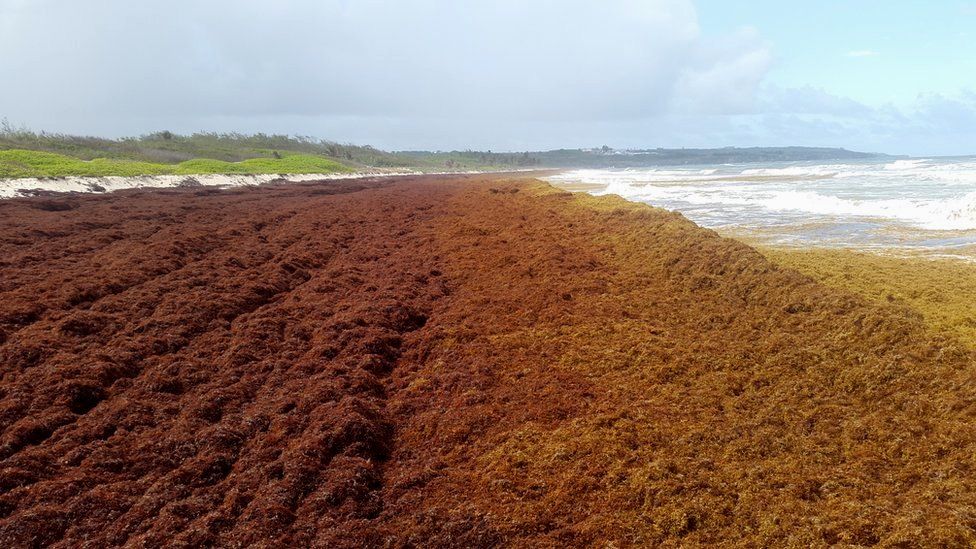Officials in Barbados and other Caribbean islands are being encouraged to take a more collaborative approach to managing the menacing sargassum seaweed, which hoteliers say continues to impact beachgoers and vacation seekers.
At the same time, some regional tourism industry operators are reporting a ramping up of effort to deal with the ongoing issue, as they outlined some best practices from which other destinations can learn.
Chief Tourism Officer with the Ministry of Tourism in Belize Raymond Mossiah said given the magnitude of the problem, the government in his country in 2015 established a “multi-sectoral task force” to get a handle on the situation.
“This task force was a public-private sector partnership. Collaboration is important,” he said, noting that the hotel association and academia are involved.
Mossiah said the challenge with sargassum should not only be seen as a tourism problem given the far-reaching impact it could have on economic activity.
“We have other stakeholders that also need to pull their weight. It is extremely important because the tourism industry is bearing the brunt of it and understandably so, but when you look at the economic impact of tourism and visitation, whether it be domestic, regional or international visitors, there is a tremendous multiplier effect that spreads throughout the economy,” he explained.
“It is therefore important that we address this sargassum issue because besides foreign exchange earnings, it has a tremendous impact on the circular flow of money throughout the economy,” he added.
Acknowledging that managing the seaweed influx could be very costly, Mossiah said the Belize Government had to provide tax relief to hoteliers.
“The hotel tax is nine per cent and we gave a tax relief of two per cent of that nine per cent so that hotels could then use that money to do some cleaning up. This is not a cheap effort. This is really expensive,” he said.
Additionally, he said the government was able to grant duty exemption on the importation of equipment that would be used in the cleaning up of the sargassum.
He also disclosed that Belizean authorities were considering a major clean energy project using sargassum and transforming it into energy.
Mossiah shared the experiences during part two of a Caribbean Hotel and Tourism (CHTA) organised webinar on Thursday, that examined the topic Sargassum: Managing the Threat, Outlook and Best Practices.
Pointing out that each territory could learn from the next, Mossiah said “Unfortunately, it is not only Belize but it is our entire Caribbean region that is affected and has been experiencing this problem.”
Moderator of the session, Denaye Hinds, Owner of the sustainability solutions firm JustaTAAD, agreed that was the right approach for companies and countries to managing the threats and finding opportunities from the sargassum.
“We all know that sargassum is an issue that we are all dealing with and we need many hands on deck. We need to take a regional approach for countries like Belize who have a task force and other innovations that we are seeing throughout the Caribbean,” she said.
“Also bearing in mind we need to manage the threat and manage the nutrients and how we reutilise sargassum . . . and look at different ways to partner with different entities in managing the guests’ perspective and outlook and talking to them about what to expect,” said Hinds.
Local hotelier Leroy Browne, General Manager of the Sea Breeze Beach House, gave a broad overview of the work his hotel was doing to manage the seaweed.
Pointing to the pungent stench associated with the decaying seaweed, Browne said this was “creating havoc” for our guests and other seabathers and persons wishing to use the beaches.
However, he said, knowing the patterns of when the sargassum would affect the island, this gave him an idea of when efforts would need to be ramped up to manage it.
“We try our best to work with the local government in terms of having help to move the seaweed,” he said.
Browne, who is the Director of “A” Class Hotels with the Barbados Hotel and Tourism Association (BHTA), said managing the expectations of guests and employees was one method that has been employed by his facility.
He encouraged other hoteliers to do the same, while calling on industry players to be extremely cautious as they clean up the seaweed to avoid disturbing turtle nests.
“We have to continue to focus on it. We know that we are going to get seaweed every year and we know that from year to year it is probably going to get heavier . I think this is a great opportunity for us to focus on it and have a plan for it every year,” he said.




